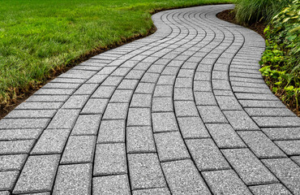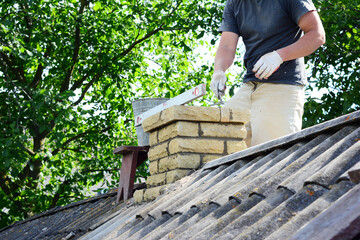Hardscaping refers to the non-living elements of a landscape. These include pathways, patios, retaining walls, water features, fences, etc.
For example, if your yard has a steep slope, a retaining wall can help level it. Adding walkways to your property can reduce the amount of landscaping maintenance since less grass grows on them.

If you have a large backyard, hardscaping can help structure it into usable spaces. The hardscape elements include patios, landscaped walkways, sitting walls, retaining walls, water features, fire pits, grill surrounds, and pergolas.
They can add an inviting and comfortable atmosphere to any outdoor living space. Hardscaping can bring a homeowner more enjoyment of their yard and increase the property value of the house. When done correctly, hardscaping can integrate seamlessly with softscape elements to create a balanced landscape design.
The materials used in hardscaping can vary depending on the homeowners preferences and style. There are many options to consider such as stone, brick, concrete, wood and pavers. Some of these materials are low maintenance, while others require regular care to keep them looking good. Some materials can also be a sustainable option, such as permeable hardscape materials that allow rainwater to pass through the surface and into the soil, rather than draining into sewers where it taxes municipal systems and washes toxins into nearby waterways.
When designing your hardscapes, make sure the colors and textures blend in well with the rest of your landscaping. It’s a good idea to create focal points within your hardscapes as this helps draw the eye and creates a sense of balance.
Another great way to incorporate hardscapes is by building structures that promote specific activities. For example, having a fire pit in your backyard encourages people to gather around and enjoy the company of friends and family. A brick patio can be a place where people sit and relax with a cup of coffee in the morning or a glass of wine at night.
Retaining walls and stone stairs or paths can also be a great way to fix a sloping yard. They can level out uneven terrain and improve drainage, preventing standing water and excess soil erosion.
When it comes to incorporating hardscapes into your home’s landscape, it’s important to work with professionals who have the skills and knowledge to help you choose the right materials and design your outdoor living space. They can guide you through the entire process from beginning to end, ensuring that your hardscapes are both functional and beautiful.
Adding hardscape features to your home’s landscape creates more usable outdoor space for entertaining, relaxing or playing. A well-designed and constructed hardscape also increases the resale value of your property. There are many types of hardscapes that can be installed, such as patios, walkways, driveways, retaining walls and decks.
Choosing the right material for your hardscape project is crucial. The right material will suit your budget, maintenance requirements and aesthetics. Common hardscaping materials include natural stone, wood, brick, concrete and pavers. Natural stone is a popular choice because it provides a classic look and comes in a wide range of colors, textures and shapes. Wood is another option because it adds warmth to the landscape and can be used for seating areas and pergolas. Concrete is a versatile and affordable material that can be used for patios, walkways, retaining walls, and outdoor kitchens. It can be stamped, colored or textured to mimic the look of natural stone or brick.
Once the design is finalized, it’s time to start installing your hardscape. A good contractor will prepare the site for installation by removing any existing turf grass or organic soil and grading the area to promote proper drainage. Then, the installers will place and set your pavers or other chosen materials. Once the installation is complete, your new hardscaped space will be ready to use.
Sustainable hardscaping is a great way to incorporate environmentally friendly elements into your home’s landscape. It reduces the amount of fertilizers, pesticides and herbicides that are used in your yard, which helps reduce pollution in the local watershed. It also helps promote wildlife habitat and reduces noise pollution in your neighborhood.
Hardscaping can increase the resale value of your home and improve its curb appeal. It also makes it easier to enjoy your yard year-round and reduces maintenance. can help you choose the right hardscape for your needs and install it properly so that it will last for years to come. Call us today to get started! We offer free estimates and consultations. Our team of experts will work with you to create a landscape that fits your lifestyle and budget.
Whether you’re planning to install a hardscape feature or looking for tips to maintain your existing one, it’s important to start with a plan. Sketching out your ideas, taking measurements, and listing the needed materials and tools will help you get started. If you’re a beginner, hiring a professional landscaper may be best to bring your hardscaping ideas to life.
When deciding to implement hardscape, it’s also important to consider the overall landscape design. Adding walkways and pathways that connect the different elements of your garden will create a cohesive look and make it easier to navigate your property. You should also take into account the amount of traffic and usage that will occur in the area. This will help you decide the material that’s right for you.
Another consideration when installing hardscape is the soil quality and compaction. If your land is not properly prepared, the foundation of your new features will be shaky and unstable. In addition, it is important to have proper drainage to avoid water pooling and damage to your hardscape. Proper drainage solutions can include French drains, gravel, or retaining walls.
Once your hardscape is installed, it will require regular maintenance to keep it in good condition. This will include routine cleaning and checking for any cracks or other signs of damage. In addition to this, it’s a good idea to add a maintenance schedule to your calendar to ensure that your hardscape is always in top condition.
While it’s possible to do some hardscaping yourself, it’s recommended to hire a professional to handle larger projects like patios and driveways. A professional will be able to ensure that your project is completed correctly and within your budget.
If you’re interested in implementing hardscaping into your landscape, is happy to help. We offer professional hardscaping services that will enhance the beauty and increase the value of your home. To learn more, contact us today! We look forward to helping you create your dream landscape!
Hardscape construction is an excellent way to add structure and definition to your outdoor spaces. The addition of walkways, patios, gazebos and retaining walls reduce the amount of grass that needs to be watered and helps keep your yard looking pristine. When paired with softscaping, such as a lush garden or colorful flowers, hardscape features enhance the look of your entire landscape.
Like anything else, though, hardscape construction needs to be properly maintained to ensure it remains functional and beautiful for years to come. While landscaping focuses on nurturing the living elements of your landscape, hardscape maintenance concentrates on the non-living components such as pavers, gravel, rocks and brick.
When it comes to hardscape maintenance, the first step is to prepare your site. This includes stripping any existing turf grass and organic material to remove it from the area to be worked on. The area may then be graded to promote proper drainage. After this, the installation process can begin.
Once the hardscape has been installed, it’s important to regularly clean the surface and apply a sealant every few years. This will protect the material from moisture and sunlight, extending its lifespan. Weeds and roots can creep between the cracks of concrete, asphalt and stone, so it’s essential to regularly pull them from your hardscape.
As the weather changes, it’s important to observe your hardscape for signs of damage or wear. Addressing these issues early on prevents them from growing into larger and more costly problems down the line. A quick fix for shallow hairline cracks, for example, is much more cost-effective than a complete replacement of an asphalt or concrete driveway down the road.
Adding hardscape features to your home doesn’t just increase its value; it also makes your yard a more comfortable and usable space for spending time with family and friends. With less grass to maintain, fewer fossil fuels are required to run lawnmowers and other power equipment, reducing your carbon footprint. By balancing hardscape and softscaping, you can enjoy a well-rounded, low-maintenance landscape that looks good year round.
